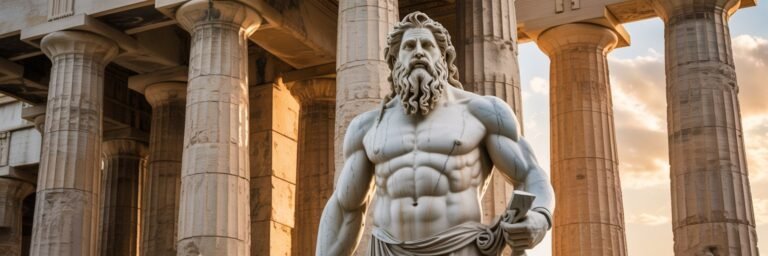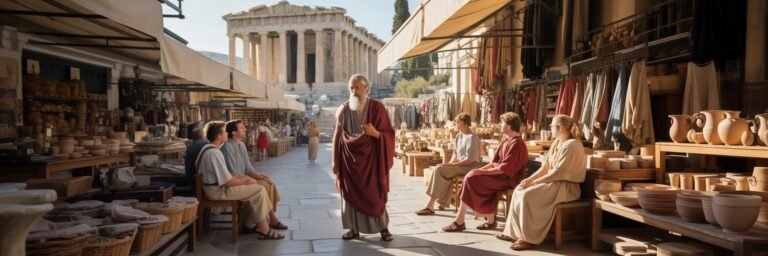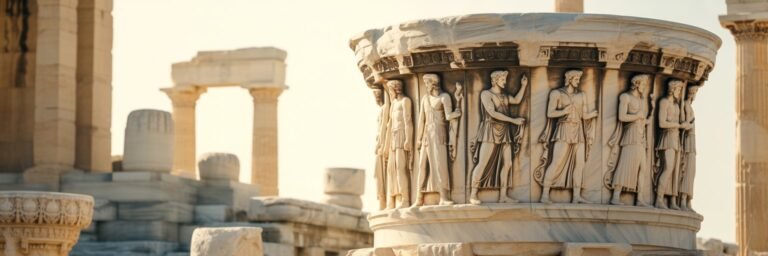INTRODUCTION
Classical Greece, spanning the 5th and 4th centuries BC, stands as a beacon of cultural and intellectual achievement in world history. As an epoch of exceptional humanistic discovery, a cradle of values and ideas that still shape contemporary thought, its allure resides not just in the tangible contributions but also in countless narratives yet untold. Propelled beyond the veil of mainstream history, these stories reveal complex dimensions to the portrait of a society renowned as much for its philosophical enlightenment as for its imperfections and internal strife.
HISTORICAL BACKGROUND
Classical Greece germinated in a landscape stitched by numerous independent city-states. Each polis, as it was known, was a universe in itself, with its distinct societal norms, strategic aquatic locales, and political strengths. This tapestry was, however, dominated prominently by Athens and Sparta.
In the 5th century BC, Athens—under the visionary statesman Pericles—flourished as the hub of culture and democracy, while Sparta, with its formidable military might and austere lifestyle, presented a stark contrast. Meanwhile, the tumultuous Persian Wars (499–449 BC) unified these disparate Greek states into short-lived alliances, setting the stage for a series of narratives—mass heroics, unanticipated alliances, political manipulations, and epic rivalries.
THEORIES AND INTERPRETATIONS
The interpretation of the Classical Greek period is bolstered by robust literary, archaeological, and epigraphical evidence. Traditional narratives extol the democratic ideals championed in Athens under Pericles, with significant focus on the cultural and intellectual prowess exemplified in the works of Socrates, Plato, and Sophocles.
However, isolated from mainstream narratives are darker interpretations burgeoning from the shadows of these glowing city-states. The treatment of metics (foreign residents), women, slaves, and the marginalized challenge the democratic portrayal of the Athenian society. Additionally, realpolitik theories propose that the alliances against the Persian intrusion were not so much a unity for Greek nationalism but maneuvers orchestrated for personal power and hegemony.
Similarly, Sparta, often portrayed as an austere, militaristic society, has alternate narratives that delve into its rich music and dance culture, and the relatively higher status of Spartan women.
MYSTERIES AND CONTROVERSIES
The untold story of Classical Greece is punctuated with mysteries and controversies. These involve salient figures such as the enigmatic Alcibiades, Athenian statesman and general, whose convoluted political allegiances oscillated between Athens, Sparta, and Persia, leading to conjecture about his true allegiance.
Then there’s the controversy surrounding Socrates’ trial. Regarded as the philosophical martyr, questions persist about the complexity of the factors leading to his conviction and execution. Was it purely because of his radical philosophical ideas, or was he part of growing resentment towards intellectuals, stoked by the defeat of Athens in the Peloponnesian War?
SYMBOLISM AND CULTURAL SIGNIFICANCE
Classical Greece was a tapestry of symbols, each narrating stories submerged beneath superficial recollections. The Parthenon’s magnificent sculptures, such as the frieze depicting the Panathenaic procession, are usually celebrated for artistic finesse. However, they also held political significance, reinforcing Athenian supremacy in the Delian League.
Similarly, theater served more than entertainment. Plays mirrored societal undercurrents and were powerful instruments of political commentary. Tragedies such as Sophocles’ ‘Antigone’ or Aristophanes’ comedies provide rich insights into the prevalent political, societal and cultural ideologies.
MODERN INVESTIGATIONS
Modern historical investigations consistently chisel the edifice of Classical Greek understanding. Techniques like rehydrating ancient ceramic pots to find residue of their original contents reveal untold narratives about trade practices, dietary habits, and economies. Bioarchaeology unravels the lives of marginalized populations, while ongoing deciphering of Linear B tablets offers untapped insight into administrative systems and societal structures.
Digital technologies play an indispensable role as well. Ground-penetrating radar aids in revealing submerged structures, and digital reconstructions of sites like the Agora or the Parthenon provide robust contexts to interpret archaeological findings.
LEGACY AND CONCLUSION
The legacy of Classical Greece resonates through the corridors of time, shaping the contours of modern philosophy, science, politics, and arts. Yet, the untold narratives of this epoch add depth and shadings, aiding in a more comprehensive understanding.
This understanding directs us to acknowledge the multitude of untapped stories and histories yet to be explored—of anonymous craftsmen who shaped the grand edifices, of the marginal voices who despite societal constraints made contributions, of lesser-known city-states that thrived in the shadows of Athens and Sparta; each waiting to be delved into, each holding the promise of altering our understanding of this already remarkable period in human history.
Behind the seeming familiarity of Classical Greece lies an infinite treasure trove that remains uncharted. Through the lens of contemporary methodologies and theories, the path stands open for ongoing dialogue, re-examination, and a deeper exploration of the untold story of Classical Greece.





